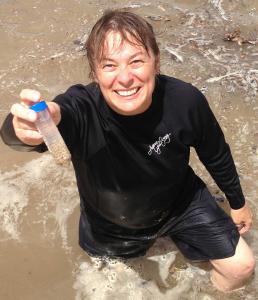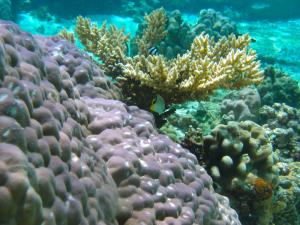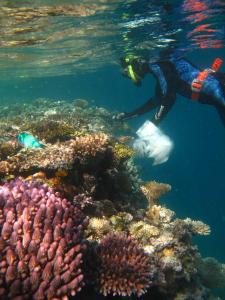Scientist wins international Ocean Challenge
Researchers plan to develop super corals resilient to ocean acidification
University of Hawaiʻi at MānoaResearch Professor, Hawaii Institute of Marine Biolog
Talia S. Ogliore, (808) 956-4531
Public Information Officer, Vice Chancellor for Research
Build a better reef, and the world will beat a path to your shore.
A marine biologist at the University of Hawai‘i at Mānoa’s Hawai‘i Institute of Marine Biology (HIMB) has won an international competition by proposing to develop stocks of corals with an extended functional range and resilience to the more acidic and warmer conditions predicted for the oceans of the future.
The winning concept titled “Building a biological toolkit to mitigate ocean acidification impacts and restore coral reefs,” is led by Ruth Gates, a researcher at HIMB, and Madeleine van Oppen, senior principal research scientist at the Australian Institute of Marine Science. They submitted their concept in response to the Ocean Challenge: Mitigating Acidification Impacts issued by the Paul G. Allen Family Foundation in collaboration with The Oceanography Society. The winning proposal was selected from a pool of 36 concepts from 7 countries around the world.
“Human-assisted evolution for corals is a radical departure from the conservation perspective traditionally applied in the field,” said Gates. “It’s often confused with GMO-type approaches in which foreign DNA is introduced, but in reality, we are proposing to accelerate naturally occurring evolutionary processes.”
Gates and van Oppen propose to build a stock of super corals that are equipped to survive the conditions in oceans of the future. “Our approach is analogous to the genetic selection of animals and plants in agriculture, aquaculture and forestry and involves pre-conditioning corals to high-acidification scenarios, selective breeding, and introducing new symbionts to the coral hosts,” said van Oppen. “Our goal is to develop and maintain banks of ecologically important, structurally diverse and geographically widespread coral species.”
As test cases, Gates and van Oppen propose to use their modified coral stocks to both restore a denuded reef and to ‘green’ a concrete artificial reef, demonstrating that over time, full reef services can be restored. This greening effort reflects a growing trend in physical restoration projects that seek to protect coastlines where native corals in barrier reef populations have been destroyed.
“Coral reefs are reservoirs of biodiversity and play central roles in coastal security, tourism and fisheries. Reef health is declining at an alarming rate across the globe as a result of human-induced climate change,” said Gates. “The results of this project have the potential to transform our capacity to preserve and restore coral reefs and to sustain human services in a future characterized by more acidic and warmer coastal waters.”
Over the last 150 years, atmospheric carbon dioxide has increased from 290 ppm to 395 ppm, primarily due to burning of fossil fuels. The ocean, as a primary carbon sink, is absorbing increasing amounts of atmospheric CO2, lowering surface water pH, impacting the global ocean ecosystem, and potentially threatening marine food supplies.
“We are extremely grateful to the Paul G. Allen Foundation for the award and for raising awareness regarding the potential gains that can be made by employing human-assisted evolution in coral reef ecosystems,” said Gates. “This is an exciting transition from documenting the demise of reefs to science focused on implementable solutions.”
###
Launched by Microsoft co-founder and philanthropist Paul G. Allen and Jody Allen in 1988, The Paul G. Allen Family Foundation is dedicated to transforming lives and strengthening communities by fostering innovation, creating knowledge and promoting social progress. Since inception, the Foundation has awarded over $469 million to more than 1,400 nonprofit groups to support and advance their critical charitable endeavors in the Pacific Northwest and beyond.
For more information, visit: http://www2.hawaii.edu/~rgates/Gates_Lab_Website/Gates_Lab.html



